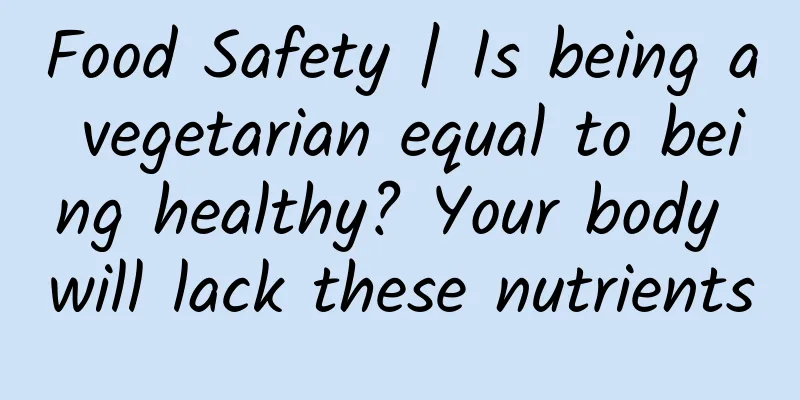Food Safety | Is being a vegetarian equal to being healthy? Your body will lack these nutrients

|
In recent years, with the high incidence of diseases such as high blood lipids, obesity, and coronary heart disease, "vegetarianism" has become more and more popular among some people. However, cases of physical illness caused by blindly advocating and extreme vegetarianism are not uncommon in life, the most typical of which is the various problems caused by malnutrition. How should we view vegetarianism? What are the adverse effects of eating only vegetarian food on the body? How can we achieve a balanced nutrition? Is being a vegetarian healthier? Can it meet nutritional needs? Vegetarianism is also a kind of catering culture, which refers to a diet that does not eat meat, poultry, seafood and other animal foods. In recent years, many people's blood pressure, blood sugar and blood lipids have turned red. It is generally believed that this is caused by excessive diet. Many people equate "vegetarianism" with healthy eating. So is vegetarianism healthier? Simply being a vegetarian will not make your body healthier. If you eat a vegetarian diet for a long time without a balanced diet, it is easy to cause nutritional deficiencies and health problems such as decreased immunity. Vegetarians are usually prone to lack of nutrients such as iron, calcium, zinc, vitamin D, vitamin B12, and ω-3 polyunsaturated fatty acids. For example, vitamin B12 can nourish nerves and is mainly found in animal foods. General plant foods do not have or contain very little, which cannot meet the needs of the human body. If it is lacking, it is easy to cause megaloblastic anemia and increase the risk of cardiovascular and cerebrovascular diseases. It is recommended that vegans add fermented soy products to their daily diet. Fermented black beans, fermented tofu, natto, stinky tofu, etc. all contain vitamin B12. In addition, nutritional supplements and fortified foods should be taken. For another example, vegetarians are very prone to iron deficiency, especially women, because childbirth and menstruation will increase the excretion of iron, resulting in insufficient iron storage in the body and leading to iron deficiency anemia. Studies have shown that the human body's absorption rate of iron from plant sources is low, only 10%, while the absorption rate of iron from animal sources is generally 20%. In addition, zinc deficiency can lead to taste disorders, loss of appetite, and slow growth and development; vitamin D deficiency can affect calcium absorption, cause abnormal bones and teeth, and babies can have rickets, which increases the risk of tumors. We would like to remind everyone that it is not recommended for children and other special groups to be vegan, as this may affect their growth and development. Parents need to have more extensive and targeted nutrition knowledge. Vegetarians should pay more attention to the scientific combination of food Compared with a healthy diet that balances meat and vegetables, it is more difficult to achieve nutritional balance by eating vegetarian food. It requires a higher level of food combination and a balanced diet is essential. Reasonable combination to consume more high-quality protein. Protein is composed of amino acids, which are also divided into good and bad. The more reasonable the composition and combination of amino acids, the higher the quality of protein. Vegetarians can adopt the principle of protein complementarity. For example, bean protein contains more lysine, while the lysine content in the amino acid composition of cereals is relatively low. If beans and cereals are cooked together, their strengths can be maximized and their weaknesses can be avoided, achieving the complementary effect of protein between the two. 2. Rationally adjust your diet to supplement nutrients. For example, long-term vegetarians are prone to vitamin B12 deficiency, which can be obtained by eating fermented bean products or taking nutritional supplements; consuming vegetable oils such as perilla oil and flaxseed oil or nuts to obtain Omega-3 fatty acids; eating more vegetables and fruits to ensure the intake of various vitamins; vegans do not eat dairy products, which reduces some calcium sources, and need to eat more other calcium-rich foods, such as tofu shreds, dried tofu, and yuba. 3. Pay attention to controlling the total energy of your diet. Vegetarians should also pay attention to controlling the total energy of their diet, especially the intake of sugar and cooking oil, and try to replace refined white rice and flour with various coarse grains and whole grains. Experts interviewed: Gu Zhongyi, Director of Beijing Nutritionist Association and Beijing Nutrition Society |
<<: This bedtime habit may keep you awake!
>>: Earthworms are good at splitting in two? My sea anemone can split in a hundred
Recommend
Why is some fur like iron plates, while some fur is very smooth?
Review expert: Zhu Guangsi, science writer Leathe...
How to analyze bidding data? How to conduct data analysis for bidding promotion?
For bidding promotion, all effect optimization mus...
IQIYI-QILIN SUAN Promotion Platform Product Manual!
"Qilin Shensuan - iQiyi Effectiveness Promot...
"A painter becomes an old painter at the age of three" and "Tracing the murderer through painting". Do the portrait artists in crime dramas really exist?
Audit expert: Zhang Haiyan Excellent science and ...
Product and Operation: A pair of good friends who love and hate each other
Today let’s talk about the conflicts with operati...
The most comprehensive in history: 37 ultimate promotion and operation methods for domestic apps
In a word, there is no more comprehensive summary...
You think the sea is blue? Actually, your eyes deceive you.
Is the ocean really blue? In a study published in...
Huawei users must know these "life-saving" functions
In recent years, Huawei has been making continuou...
Don’t fall into the trap again! Common problems and strategy analysis of community operations!
What is the difference between community operatio...
10 secrets of Apple: Inside Apple's product design studio
If we were to add an adjective to Apple, there wo...
What would happen if you dropped your Motorola Droid Turbo into water?
If you want to test whether the water resistance ...
How to use coupons? A brief analysis of how to play the activity!
Coupons are rarely missed in any activities among...
360: 2019 Intelligent Connected Vehicle Information Security Annual Report
The report reviews the development of information...
How to create a high-quality circle of friends through private domain traffic operation
1. Why do we need to build a circle of friends? F...






![[Chasing Dreams among Stars] Zhang Qianggong: Standing on the Roof of the World, Listening to the Voice of the Earth](/upload/images/67f2343f344e9.webp)


